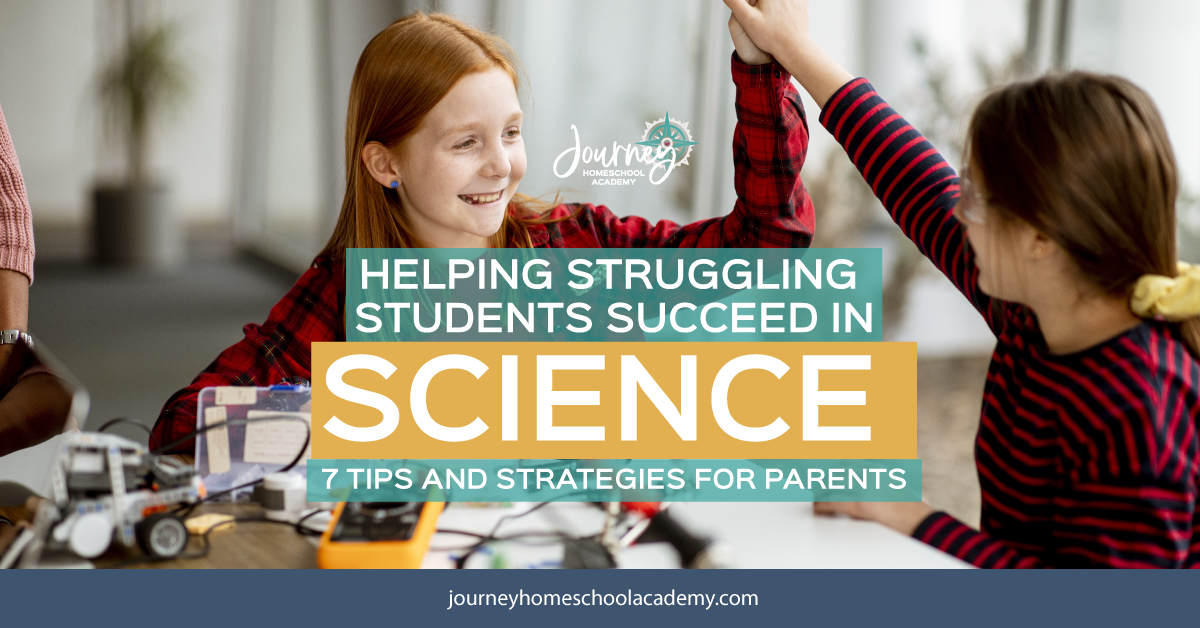We get it– every student (even within your own family) has a specific learning style that works for them. For most, it’s tied directly to their personality and how they process and react to information. Your 8-year-old may have no issues with reading a book and narrating it back to you, while your 10-year-old would much rather watch a video covering the material and then draw a picture about it.
In science, these learning styles become especially distinct and can often make you feel like your student is falling behind. Helping struggling students succeed in science may seem daunting at first, but here are 7 tips and strategies that can truly make a difference in your homeschool journey!

Try Out More Than One Curriculum
For starters, are you using the right curriculum? With so many options on the market, you might feel tempted to just pick a top-rated curriculum and move on. However, if you already have an inkling that your student might struggle with science, don’t rush the decision! Take the time to peruse each curriculum option and evaluate each format. Pay attention to:
- How testing is formatted
- The number of weekly reading assignments
- Utilization of experiments/labs (and if they’re feasible for your family)
- The format of the main instruction (reading, video, etc.)
- The course schedule and pace of learning
Many homeschool curriculums offer a free lesson sample for you to try out and read through before buying. We highly recommend that you take advantage of this!
To give you a jump start, check out this extensive review of the best Christian-based homeschool science curriculum.
Scaffolding Instruction

If you’re new to this term, scaffolding instruction is basically just a way to provide increased support in mastering course topics and terms. Learning never stops, but it’s important that you take the time to help your struggling student by reinforcing what they have learned in days and weeks past.
For some, this might look like asking your student to remind you what they learned about the day prior. This could mean you ask for three things that they remember. For others, you may need to jump farther back and review topics learned from weeks prior. This is a great opportunity for preparing for tests as well!
Don’t Be Afraid to Use Technology
In today’s techy world, it’s nearly impossible to find a home that doesn’t utilize phones, computers, and/or tablets for learning. Even public schools are filled with technology, starting as young as preschool. While we will always encourage going back to the basics for learning, we also understand how useful technology can be.
Helping struggling students succeed in science might mean you need to take a break from reading that big textbook and instead turn to YouTube for a video about the process of photosynthesis or the life cycle of a tadpole. Some students just learn better with visual and auditory aids, and technology can fill that void. Don’t abuse it (and set boundaries as necessary), but also don’t be afraid to use it!
Encourage, Encourage, Encourage!

As a homeschool parent/teacher, it’s so easy to get caught up in the day-to-day stressors of homeschooling. You’re doing a full-time job plus being a full-time parent, and that is no easy task. When was the last time you encouraged your struggling student in their learning? It seems like an easy thing to do, but we often forget to cheer on our kids as they learn.
Small wins are still wins, so celebrate every completed homework assignment and every well-done test. And even if your student isn’t “successful,” encourage them to press onward. Let them know that you’re here to walk alongside them. That’s probably a big reason why you chose to homeschool, right?!
Remember to encourage yourself, too. It’s so easy to compare our children to those in other families, or even to compare our own children to each other. Don’t let yourself fall into this trap! Every family homeschools differently, and every child learns differently and at their own pace. Each child has their own unique strengths and weaknesses, so even if they struggle in one area they’re probably doing wonderfully in others. No person is good at everything, and that’s okay!
Utilize Silly Songs and Funny Phrases
Songs aren’t just for preschool and kindergarten. Raise your hand if a song or phrase you learned as a child has still stuck with you today! Music and mnemonic phrases have this magical capability to stick in our brains for a really long time, sometimes to the point of being annoying.
For students of all ages struggling in science, these tools can be super useful. For concepts like the periodic table of elements or the layers of the earth’s atmosphere, help your child to come up with silly acronyms or mnemonics that will be so funny that they won’t be able to forget them.
In addition, many music streaming services offer a wide variety of songs about science, some to popular tunes that your child likely already knows. And remember, older kids might at first balk at goofy “little kid” songs, but pretty soon, they’ll have the beat (and the science concepts!) stuck in their heads too.
Scale Back on Quizzes and Tests

Although homeschooling comes with wonderful flexibility, we often feel pressured to keep up with methods of testing. Most curriculums come with quizzes and exams, and we want our kids to succeed at these tests, right?
The answer is yes, but with even more room for flexibility. If your student is struggling in science, don’t be afraid to take a few weeks off from quizzing. Or sit down with your student and walk through their weekly quiz with them. Don’t give them all the answers, but guide them through it and try to get a glimpse of how their brain is working as they take a test. You may quickly realize that for some children, multiple choice just doesn’t work; for others, it might be easy!
Note: As your student gets older, testing may be a required part of your state’s homeschool requirements. We will never encourage you to go against your state’s rules, so keep administering tests. However, take the time to watch as your student tests and let them explain to you what they are struggling with and why. This will better equip you to guide them through preparation for the next test!
Apply These Strategies to Math Class Too!
Math and science often go hand-in-hand. In many lab activities, math concepts are necessary to complete these labs, especially as you get farther up in grade levels. Chemistry, for example, is loaded with opportunities to practice math.
If your student is struggling in science, there’s a good chance they’re also having difficulties in math. That being said, feel free to take the tips and strategies above and apply them to math class as well. You might just be able to knock out two birds with one stone!

Helping Struggling Students Succeed in Science with Journey Homeschool Academy
No student wants to struggle in school, and no parent wants that for their child! At Journey Homeschool Academy, we also want to see your child succeed at homeschool science. It’s easier than you think!
Our science courses stretch across many grade levels, with course material tailored specifically to your child’s age and learning style. We have worked hard to integrate visual, auditory, and kinesthetic skills into each of our courses, ensuring that wherever your students are in life, they can succeed in science.
